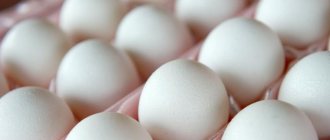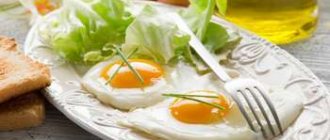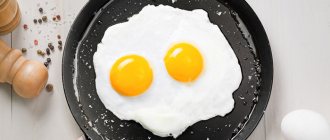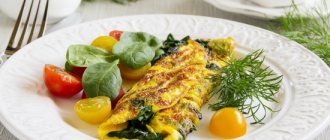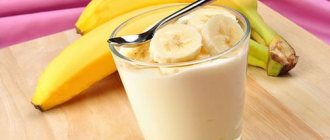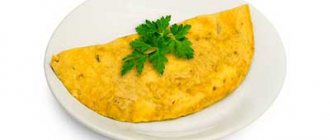- August 19, 2018
- Diets
- Rosalia Rison
Today we will talk about such a useful product as a chicken egg. What is its use? Why should humans eat eggs? What is the calorie content of 1 pc. chicken egg white? For what purposes are eggs used in cooking? We will also look at what can be prepared from them. So let's start with the general benefit.
The benefits of eggs for the body
There are at least several reasons to use this product. Let's study them so as not to be unfounded.
- The yolk contains vitamin D, which is necessary for children and adolescents, because it contributes to the proper formation of teeth, bones, skeleton and nervous system. Eggs are second only to badger and fish oil in terms of the content of this vitamin.
- Egg white can eliminate headaches, as it is responsible for normalizing blood pressure in our body. Both arterial and intracranial.
- Vitamin B4, which is contained in protein, has a beneficial effect on the nervous system and activates mental activity.
- Eggs are able to cleanse your body of toxins and expel excess fluid from the body.
- Eggs have a positive effect on the reproductive system of men and women. Since their consumption produces serotonin.
- The presence of folic acid indicates that eggs are a very important product for pregnant women, which helps the fetus develop normally.
- Omega acids cleanse blood vessels and prevent the development of their diseases.
- Vitamin E, which is part of eggs, is responsible for beauty, namely, it helps maintain healthy hair, skin and nails.
- The presence of calcium in eggs suggests that this product helps maintain teeth and bones in good condition.
- Egg white is characterized by rapid digestibility by the body. Moreover, eggs are one of those rare products that are completely absorbed by the body.
- Eggs help avoid depression and mood swings. They relieve insomnia and promote good sleep, so if you have such problems, you should eat this protein product three hours before bedtime.
- Due to their high protein content, eggs are recommended for athletes who want to gain muscle mass.
- Eggs are an excellent product for losing weight. Calorie content 1 pc. boiled egg white is 18 kcal. Agree, very little. Therefore, for weight loss to be effective, it is better to eat eggs without the yolk. Since it contains 64 kcal, which exceeds the calorie content of 1 piece. boiled egg white almost 3.5 times.
Calorie content and nutritional value Chicken egg
The eggs of different bird species differ in composition, the ratio of nutrients and their own weight. The weight of chicken ranges from 40 to 80 g, so for convenience it is customary to supply the amount of nutrients for them, as for all products, per 100 g of raw material. That is, data on the nutritional value of eggs is the average statistical value not for 1 piece, but for 100 g, which must be taken into account when preparing a diet.
The clear liquid part of the egg is the white, which contains water, nutrients, vitamins and minerals.
Protein composition
| Element | Percentage |
| water | 85% |
| proteins | 13% |
| fats | 0,3% |
| carbohydrates | 0,7% |
| mineral salts, glucose, enzymes, vitamins | 1% |
| energy value | 44 kcal per 100 g |
The yolk makes up about a third of the total mass and consists mainly of fatty acids. The average egg contains 6 to 7 grams of fat. The yolk mass consists of substances beneficial to humans.
| Element | Benefits for humans |
| water | for water-salt metabolism |
| fatty acids: linoleic, linolenic, oleic, palmitic, stearic | for lipid metabolism |
| trace elements - calcium, potassium, iron, phosphorus, magnesium, zinc, iodine, selenium | for strong bones and strong muscles, high hemoglobin, thyroid hormones |
| fat-soluble vitamins - E and D | have a beneficial effect on the condition of hair, nails and skin; |
| B vitamins - B1, B3, B6, B12 | for a strong nervous system and healthy musculoskeletal system |
| vitamin A | for good vision |
| biotin | to regulate metabolism |
| folic acid | for cell growth and development |
| choline | for fat metabolism |
| lecithin | essential element of cell membranes |
| cholesterol | for the synthesis of steroid hormones, vitamin D and bile acid, strengthening cell membranes |
| energy value | 352 kcal per 100 g |
Cholesterol is contained only in yolks (up to 570 mg) and is the least harmful to humans, since its effect is neutralized by lecithin.
The amount of nutrients depends on the cooking method. The ratio of protein, fat and carbohydrates of a cooked product differs from that of a raw or fried product due to the heat treatment, which destroys the proteins, as well as the addition of oil during frying. There is the same amount of fat in a boiled egg as in a raw one, but less than in a fried one.
| Calorie content, kcal | 157 |
| Proteins, g | 12,7 |
| Carbohydrates, g | 0,7 |
| Fats, gr | 11,5 |
So, you ate 1 boiled chicken egg for breakfast or dinner. To find out how it fits into your diet, let's see how many calories are in a hard-boiled egg with yolk.
The energy value of one medium chicken egg (40-60 g) is:
- 70–80 kcal for hard-boiled;
- 60–65 kcal - soft-boiled;
- 50–55 kcal for boiled yolk;
- 17 kcal for protein.
If you are making egg salad, then it is more convenient to take into account the calorie content per 100 grams of product, which can be taken from the table.
| Chicken eggs/100 g | Number of kilocalories |
| Raw | 157 |
| Hard Boiled | 160 |
| Soft-boiled | 154 |
| Fried | 200 |
| Boiled with mayonnaise | 145 |
| Boiled squirrels | 44 |
| Boiled yolks | 352 |
A proper diet should be balanced not only in calories, but also in nutrients: proteins, fats, carbohydrates.
BZHU boiled egg, 1 pc.:
- proteins (proteins) - 6.6 g;
- fats - 6.1 g;
- carbohydrates - 0.3 g.
Egg white proteins are a particularly valuable product; they contain 7 essential amino acids, the most important of which are:
- tryptophan - participates in the production of serotonin - the hormone of good mood;
- methionine - responsible for burning fat in the body;
- lysine is a building material for protein synthesis in the body.
There are a lot of proteins in the yolk, but fats still predominate in it.
Fat composition of chicken yolk:
- fats - 1.6 g;
- monounsaturated fatty acids (favorable for the heart and blood vessels) - 3.5 g;
- polyunsaturated omega acids - 1.7 g;
- saturated fatty acids - 2 g;
- cholesterol - 0.13 g.
Such a beneficial combination of fats for the body is found only in salmon oil!
| Chicken eggs/100 g | Proteins (g) | Fat (g) | Carbohydrates (g) |
| Raw | 12,7 | 11,5 | 0.7 |
| Hard Boiled | 13 | 11,6 | 0,8 |
| Soft-boiled | 12,8 | 11,6 | 0,8 |
| Fried | 12,9 | 21 | 0,9 |
| Protein | 10,5 | 0,1 | |
| Yolk | 17,8 | 30,9 | 0,7 |
So, there are almost no carbohydrates in chicken eggs, they are a source of protein and healthy fatty acids and at the same time have low calorie content, so they are included in the diet of many diets: therapeutic and sports.
In addition to KBJU, the nutritional value is provided by the mineral composition of proteins and yolks. In addition to amino acids, chicken protein contains a complex of B vitamins, which are necessary to maintain immunity, normal metabolism and the health of the nervous system.
The composition of chicken yolk is even richer:
- fat-soluble vitamins A, E, D;
- biotin (B7);
- choline (B4);
- the most important minerals: phosphorus, sulfur, potassium, magnesium, iron, selenium.
Harm to eggs
Everything has a downside. Let's look at why eggs should be eaten in moderation.
- Don't forget that consuming too much protein can harm your body. Just eat your norm: 1.5-2.5 grams of protein per kilogram of a person’s weight.
- There is still debate about whether egg yolks contain cholesterol. However, defenders of this product argue that cholesterol is divided into harmful and beneficial, and eggs contain the latter type.
- There is also egg intolerance. Moreover, they can cause allergic reactions in some people.
- Don't forget that fried eggs contain bad cholesterol. It is better to use them in any other form (preferably boiled).
- You should not eat eggs if you have gallbladder diseases.
Eggs for weight loss
Some diets use eggs for weight loss. First of all, we are talking about low-carb diets. Such diets are based on modern ideas about metabolism. By eliminating carbohydrates, we launch fat breakdown processes. As a result, ketone bodies appear in the blood, which help suppress appetite. Eggs can also be used in low-calorie diets. The calorie content of hard-boiled and soft-boiled eggs allows us to consider these products dietary. Their energy value per serving is low. And the feeling of fullness comes for a long time. Eggs are a source of valuable vitamins and microelements. Moreover, these substances are absorbed from eggs very well. A chicken egg per 100 grams contains: phosphorus - 192 milligrams, potassium - 140 milligrams, sodium - 134 milligrams, calcium - 55 milligrams, magnesium - 12 milligrams, iron - 2.5 milligrams, copper - 83 micrograms, cobalt - 10 micrograms. All these substances are especially needed to maintain health for those who are constantly struggling with excess weight through various unbalanced diets. However, overuse of eggs can lead to undesirable consequences. This is especially true for those whose cholesterol levels, according to blood biochemistry, exceed normal values. Therefore, eggs for weight loss should be used only with good blood biochemistry tests.
How many eggs can you eat?
The maximum number of eggs that can be eaten depends on age, as well as physical activity and the goal pursued by the person.
- Children under 3 years old can consume only 3 per week.
- Children under 7 years of age are not recommended to eat more than 5 eggs per week.
- Teenagers can eat up to 7 eggs per week.
- Adults are not recommended to eat more than 10-15 eggs per week. No more than two per day.
- Athletes with high loads can eat about 3-5 eggs a day, since with great physical activity this product is digested many times faster.
- People on a diet are usually recommended to eat the whites of boiled eggs. Calorie content 1 pc. protein only 18 kcal. Those who are losing weight can eat up to 3-4 proteins per day.
- During the “drying” of the body, you can only consume proteins, and they are limited to 20 g.
- Older people should not eat more than one egg per day.
Important note: if you have any health problems, it is better to check your egg intake with your doctor.
How to select and store
The characteristics are subject to the requirements of state standards. The shells of eggs that go on sale must be marked with letters and numbers. What does it mean?
- The letter designations “D” or “C” indicate the “age” of the product. “D” (dietary) - those that ended up on the counter within the first 7 days from the date of production. Such products can be purchased in the immediate vicinity of the production site. “C” (table eggs) are sold everywhere.
The degree of freshness is the main difference between products of categories “D” and “C”. Dietary eggs “older” than 7 days mechanically pass into the category of table eggs.
Photo: gulfnews.com
- Digital marking indicates mass. The higher the number, the lighter and smaller the egg. Selected product C0 (weight from 65 to 74.9 g) is heavier and larger than C1 (category 1 weighing 55-64.9 g). Large specimens weighing more than 75 g are marked with the letter “B” and belong to the highest category.
The taste and quality of eggs do not depend on their size and shell color.
In the store you should pay attention to 2 points:
- Date of manufacture. Eggs remain fresh for 25 days when stored at room temperature and 120 days when stored in the refrigerator.
- Manufacturer's address. The closer the manufacturing site is to the sales center, the better.
At home, eggs should be stored away from substances with strong odors. The optimal temperature is from 0 to 5°C.
You will learn about the freshness of eggs and beneficial properties from this talk show “About the Most Important Thing” with Sergei Agapkin and Doctor of Medical Sciences, leading researcher, professor of the Federal State Budgetary Institution of Science “Federal Research Center for Nutrition and Biotechnology”, doctor of the highest category, Alla Vladimirovna Pogozheva.
Eggs in cooking
Eggs are a unique product that is used in the preparation of many dishes. You can do literally anything with them. Every day - a new egg dish. Let's look at an approximate diet for a week with this product:
- Monday: fried eggs for breakfast, eggs with sausages and peas for lunch, deviled eggs for dinner.
- Tuesday: egg roll for the morning, zucchini appetizer with eggs for lunch, pies with cabbage and egg for dinner.
- Wednesday: omelet in the morning, cauliflower with eggs and herbs for lunch, hot sandwiches with eggs for dinner.
- Thursday: scrambled eggs on bread (toast) for breakfast, lavash roll with saury and eggs for lunch, pancake cake in the evening.
- Friday: egg pancakes in the morning, sponge cake in the afternoon, Mimosa salad with eggs in the evening.
- Saturday: breakfast - poached eggs, lunch - eggs baked in potatoes, dinner - muffins.
- Sunday: breakfast with toast and eggs, lunch with salad with beans and eggs, dinner with cheesecakes.
As you can see, you can eat them for the whole week 3 times a day (see the norm for eating eggs). True, it is still better to diversify your diet with something else, since consuming too much protein is harmful to health. We just wanted to show you that eggs can be used to make enough dishes for every day of the week.
Egg readiness
How to determine how long to boil eggs? It all depends on the goals. Provided that you cook the product over medium heat:
- Boil soft-boiled eggs for about three minutes after the water boils.
- If you want to cook them “in a bag”, then after the water boils, take them out after four minutes.
- Hard-boiled eggs need to be cooked after the water boils, about ten minutes.
Vitamin content
Table 1
| Vitamins | Content | Daily norm |
| A (retinol) | 260 mcg | 26 % |
| E (α-, β-, γ-tocopherols) | 0.6 mg | 6 % |
| D (lamisterol) | 2.2 mcg | 88 % |
| B1 (thiamine) | 0.07 mg | 4.67 % |
| B2 (riboflavin) | 0.44 mg | 24.44 % |
| B3 (PP) (nicotinamide) | 3.6 mg | 18.95 % |
| B4 (choline) | 251 mg | 50.2 % |
| B6 (pyridoxine) | 0.14 mcg | 7 % |
| B9 (folacin) | 7 mcg | 3.5 % |
| B12 (cobalamin) | 0.52 mcg | 17.33 % |
A chicken egg contains vitamins with high, medium and low levels, if we consider them according to the approved standards for the significance of the nutritional value of the product.
At the highest level of importance in the food value chain are:
- A, takes part in all functions of the body related to its growth and proper metabolism, preserves the structure of the cornea of the eye.
- D, takes part in the formation of bone and dental tissue.
- B2, maintains body tone.
- PP, participates in the formation of hemoglobin.
- B4, is involved in the biosynthesis of heme and proteins, cell proliferation, and tissue respiration.
- B12 is involved in many metabolic processes in the body.
Vitamins at a medium level of importance include:
- E, keeps the muscular system in good shape.
- B6, participates in the metabolism of lipids and amino acids.
Vitamins of low content include:
- B1, required to normalize the nervous and muscular systems.
- B9, supports the hematopoietic and digestive system.
Calorie content of eggs
Let us now consider the calorie content of one whole egg, yolk and 1 egg white.
Calorie content 1 pc. boiled egg on average 80 kcal (160 kcal per 100 g).
The yolk contains 352 kcal per 100 g. Accordingly, one egg yolk contains about 64 kcal.
Calorie content 1 pc. boiled egg white is 18 kcal. 100 g – 44 kcal.
Types of eggs and their calorie content
The popularity of the product is explained by its high taste characteristics and benefits for the body. In modern cooking, there are dozens of options for their preparation - from modest fried eggs to masterpieces of confectionery art.
Photo: adayinthekitchen.com
Eggs are easy to digest, and their chemical composition is rich in valuable elements and vitamins. This is one of the few components of the diet that is absorbed in almost 100% volume.
Several types of eggs are in demand among consumers:
- Chicken is a classic of the genre and a hit in the budget consumer basket. The nutritional value of 1 chicken egg in nutrition is equal to 100 g of meat. They are found with white and brown shells. The color of the shell matches the chicken's plumage. The average weight of 1 piece is 70 g.
- Quail eggs occupy 2nd place in terms of prevalence. They are fattier than chicken, but less allergenic. They are considered an environmentally friendly product, since poultry requires careful treatment and a thoughtful menu of harmless “chemicals”. The small egg is protected by a speckled shell and weighs about 17 g.
- Goose egg is a product with an expressive taste and powerful antioxidant properties. It is useful for strengthening the immune system and is actively used in cooking. Sold only at farmers' markets. The average weight of 1 copy is 200 g.
- Turkey eggs are similar in appearance and nutritional value to their chicken counterparts. The main difference is the higher fat content. Turkeys lay few eggs and seasonally, so their eggs are purchased individually by contacting the farmer-breeder. Weight of 1 piece – 70-72 g.
- Ostrich eggs are large exotic specimens. Giant size and bright taste are their key features. The weight of eggs depends on the breed of ostrich. A common indicator is 1600 g.
One ostrich egg can feed a company of 10 people.
Photo: quora.com
- Egg powder, or melange (from the French mélange - mixture) - dried and crushed whites and yolks of ordinary eggs. It is used for preparing dishes - omelettes, pastries, cutlets. The advantages of dry mixture over fresh eggs are a long shelf life and the absence of pathogenic microbes. During the processing process, whites and yolks are pasteurized.
Let’s figure out which egg is better, quail or chicken, together with Elena Malysheva in the program “Live Healthy.”
The energy value of eggs varies. The large size of the bird does not guarantee a high calorie content of the product. This is noticeable when comparing the calorie content per 100 grams and per 1 raw egg :
| View | Kcal per 100 g. | Kcal in 1 piece |
| Chicken | 157 | 100 |
| Quail | 168 | 28,5 |
| Gusinoye | 100 | 200 |
| Indyushinoye | 170 | 123 |
| Ostrich | 120 | 1300 |
| Egg powder | 540 | — |
The number of calories consumed will depend on the amount of egg mass eaten. We invite you to familiarize yourself with the egg diet, which is good for your figure, health, and is suitable for people with diabetes.
Egg recipes
As we have already said, we will never know the exact number of existing recipes with the addition of eggs, because almost every day new interesting dishes are invented.
Eggs are a universal product that absolutely all housewives love. It can be fried, boiled, baked. This is one of the required ingredients in many salads, as well as in baked goods: pancakes, pancakes, cheesecakes, cakes, pies, muffins, pastries. Every housewife and every second man knows how to boil and fry eggs.
Consider a recipe for a delicious salad with egg pancakes.
Chicken salad with egg pancakes
Ingredients:
- 500 grams of chicken fillet;
- 7 chicken eggs;
- onion;
- can of canned corn;
- 7 tbsp. l. sour cream;
- Art. l. rast. oils;
- 150 ml water;
- 1.5 tbsp. l. Sahara;
- salt.
Let's prepare our salad:
- We wash the fillet and set it to cook over medium heat. After the water boils, cook the meat for another half hour. Don't forget to salt the water.
- Peel the onion and cut into half rings.
- Prepare the pancakes: break the eggs into a bowl and add a little salt. Shake with a fork. Fry the pancakes in a frying pan in vegetable oil on both sides for a minute.
- We should have about seven pancakes. Stack them and cut them into thin strips.
- We cut the boiled chicken fillet into strips.
- Fry the onion for 3-4 minutes.
- Now we assemble the salad: put the fillet, onion, pancakes and corn together and mix. Season with sour cream. If the salad seems unsalted, add a little salt.
The salad will taste better if it is left to cool in the refrigerator for an hour. Bon appetit!
